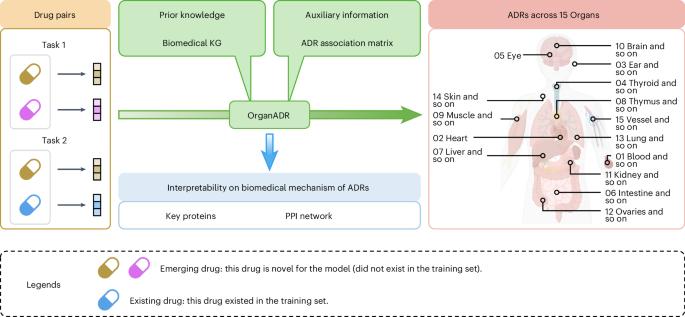Predicting adverse drug reactions for combination pharmacotherapy with cross-scale associative learning via attention modules
IF 18.3
Q1 COMPUTER SCIENCE, INTERDISCIPLINARY APPLICATIONS
引用次数: 0
Abstract
The rapid emergence of combination pharmacotherapies offers substantial therapeutic advantages but also poses risks of adverse drug reactions (ADRs). The accurate prediction of ADRs with interpretable computational methods is crucial for clinical medication management, drug development and precision medicine. Machine-learning and recently developed deep learning architectures struggle to effectively elucidate the key protein–protein interactions underlying ADRs from an organ perspective and to explicitly represent ADR associations. Here we propose OrganADR, an associative learning-enhanced model to predict ADRs at the organ level for emerging combination pharmacotherapy. It incorporates ADR information at the organ level, drug information at the molecular level and network-based biomedical knowledge into integrated representations with multi-interpretable modules. Evaluation across 15 organs demonstrates that OrganADR not only achieves state-of-the-art performance but also delivers both interpretable insights at the organ level and network-based perspectives. Overall, OrganADR represents a useful tool for cross-scale biomedical information integration and could be used to prevent ADRs during clinical precision medicine. An associative-learning-enhanced model, called OrganADR, is developed to predict adverse drug reactions at the organ level. OrganADR could be applied in emerging combination pharmacotherapies and improve medication safety.

基于注意模块的跨尺度联想学习预测联合药物治疗不良反应。
快速出现的联合药物治疗提供了实质性的治疗优势,但也带来了药物不良反应(adr)的风险。利用可解释的计算方法准确预测不良反应对临床用药管理、药物开发和精准医疗至关重要。机器学习和最近开发的深度学习架构努力从器官角度有效阐明ADR背后的关键蛋白质-蛋白质相互作用,并明确表示ADR关联。在这里,我们提出了OrganADR,这是一个联想学习增强模型,用于预测新兴联合药物治疗中器官水平的adr。它将器官水平的不良反应信息、分子水平的药物信息和基于网络的生物医学知识整合成具有多个可解释模块的综合表示。对15个器官的评估表明,OrganADR不仅达到了最先进的性能,而且在器官层面和基于网络的角度提供了可解释的见解。总体而言,OrganADR是跨尺度生物医学信息整合的有用工具,可用于预防临床精准医学中的不良反应。
本文章由计算机程序翻译,如有差异,请以英文原文为准。
求助全文
约1分钟内获得全文
求助全文

 求助内容:
求助内容: 应助结果提醒方式:
应助结果提醒方式:


